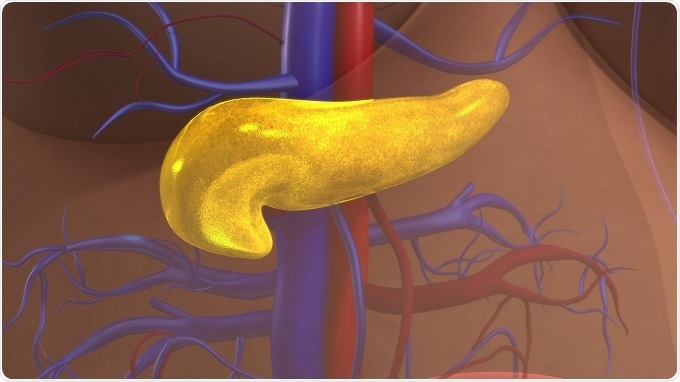A landmark study conducted by the University of Southern California and published this week in the journal Cell provides hope for restoring insulin production in patients with diabetes. The study showed that when food is restored to mice on a very low calorie diet that mimics fasting, new insulin-producing cells develop.

© sciencepics / Shutterstock.com
Animals are designed to withstand periods of limited food availability. They store fat in times of plenty and burn it for energy when food becomes scarce. Today, humans still have the desire to eat fat-rich food to prepare for lean times.
However, in developed countries food continues to be plentiful and the famine never arrives. Consequently, fat stores far exceed those needed to survive food scarcity and an epidemic of obesity and diabetes has ensued.
In diabetes (both type 1 and late-stage type 2) the beta cells in the pancreas that are responsible for producing insulin in response to high blood glucose levels lose the ability to do so. Blood sugar levels consequently increase to dangerously high levels that lead to a range of life-threatening conditions.
Currently, diabetes is treated by injecting the insulin needed to stabilize blood sugar levels. The latest study indicates that regular, but intermittent adherence to a diet that mimics fasting can restore insulin-producing function to the pancreas.
Mouse diabetes models (both type 1 and type 2) were placed on the fasting mimicking diet for 4 days of each week. Researchers found that after the diet the mice regained healthy insulin production and their blood glucose levels stabilized. This was found to be due to reactivation of the genes responsible for pancreatic development, which in turn promotes the growth of new, healthy insulin-producing cells.
Professor Valter Longo, from the University of Southern California, explained "Our conclusion is that by pushing the mice into an extreme state and then bringing them back - by starving them and then feeding them again - the cells in the pancreas are triggered to use some kind of developmental reprogramming that rebuilds the part of the organ that's no longer functioning."
Similar results were observed on analysis of pancreatic cell cultures from human donors with type 1 diabetes. These exciting findings suggest that a Fasting Mimicking Diet could provide an alternative, or at least augment, insulin injection in patients with diabetes.
These findings warrant a larger FDA trial on the use of the Fasting Mimicking Diet to treat diabetes patients. Hopefully, people with diabetes could one day be treated with an FDA-approved Fasting Mimicking Diet for a few days each month, eat a normal diet for the rest of the month, and see positive results in their ability to control their blood sugar by producing normal levels of insulin and improving insulin function."
Professor Valter Longo
Source:
Cheng C-W, et al. Fasting-Mimicking Diet Promotes Ngn3-Driven β-Cell Regeneration to Reverse Diabetes. Cell 2017; 168(5):775–788.